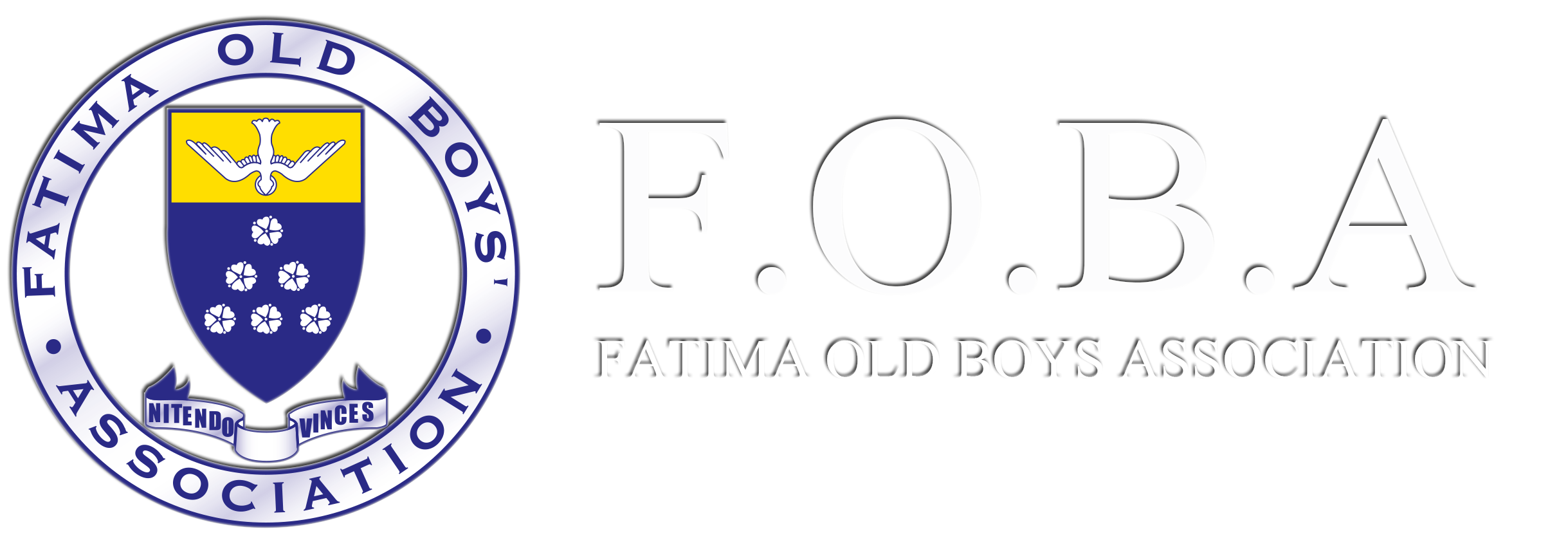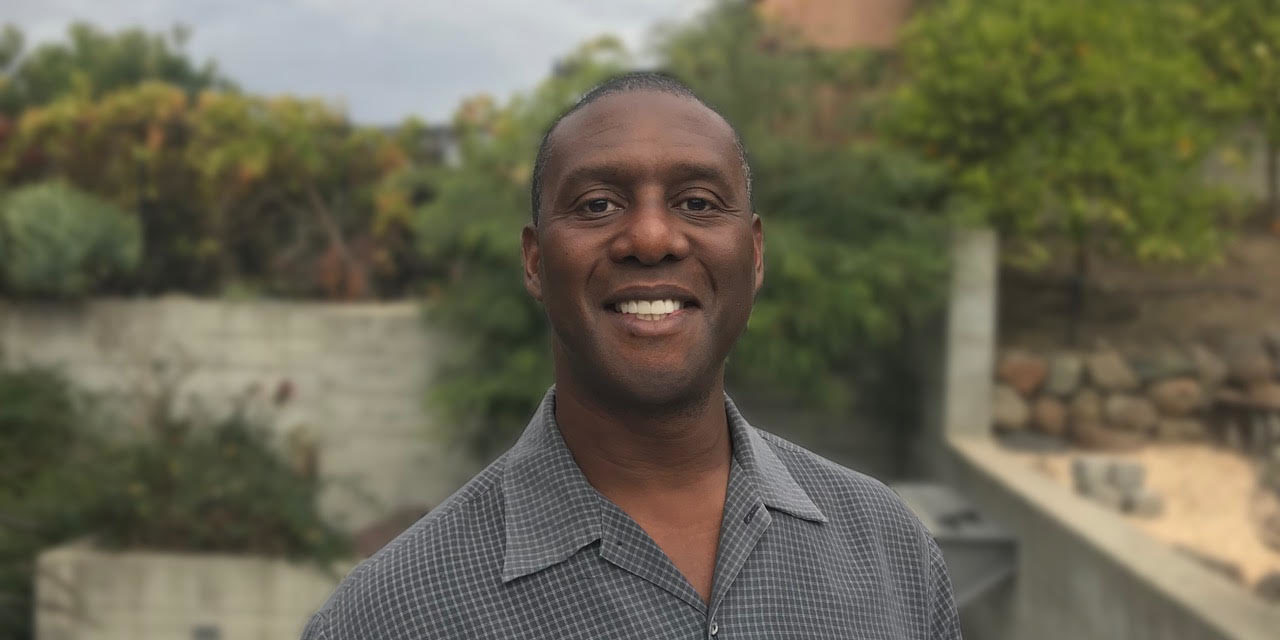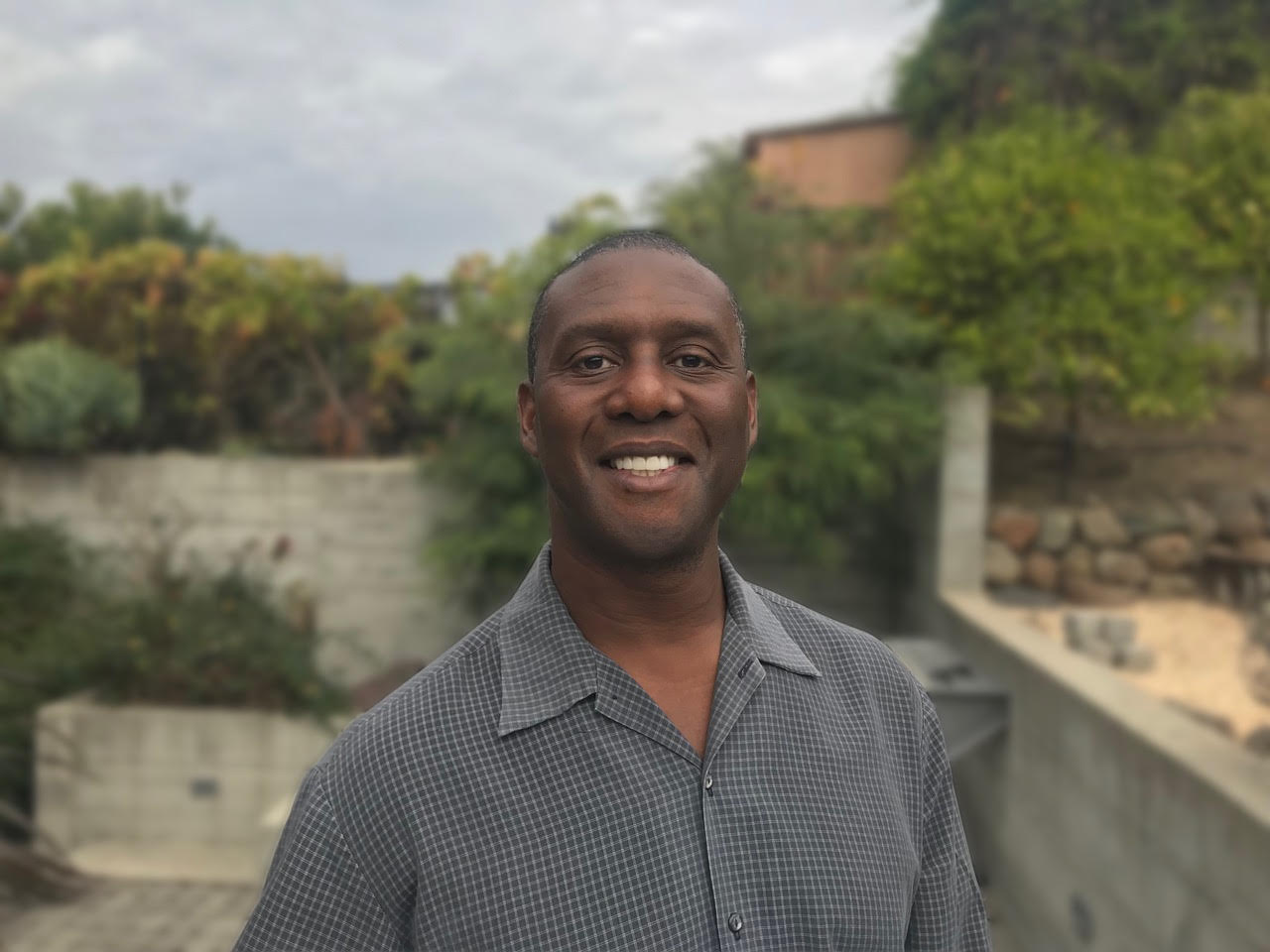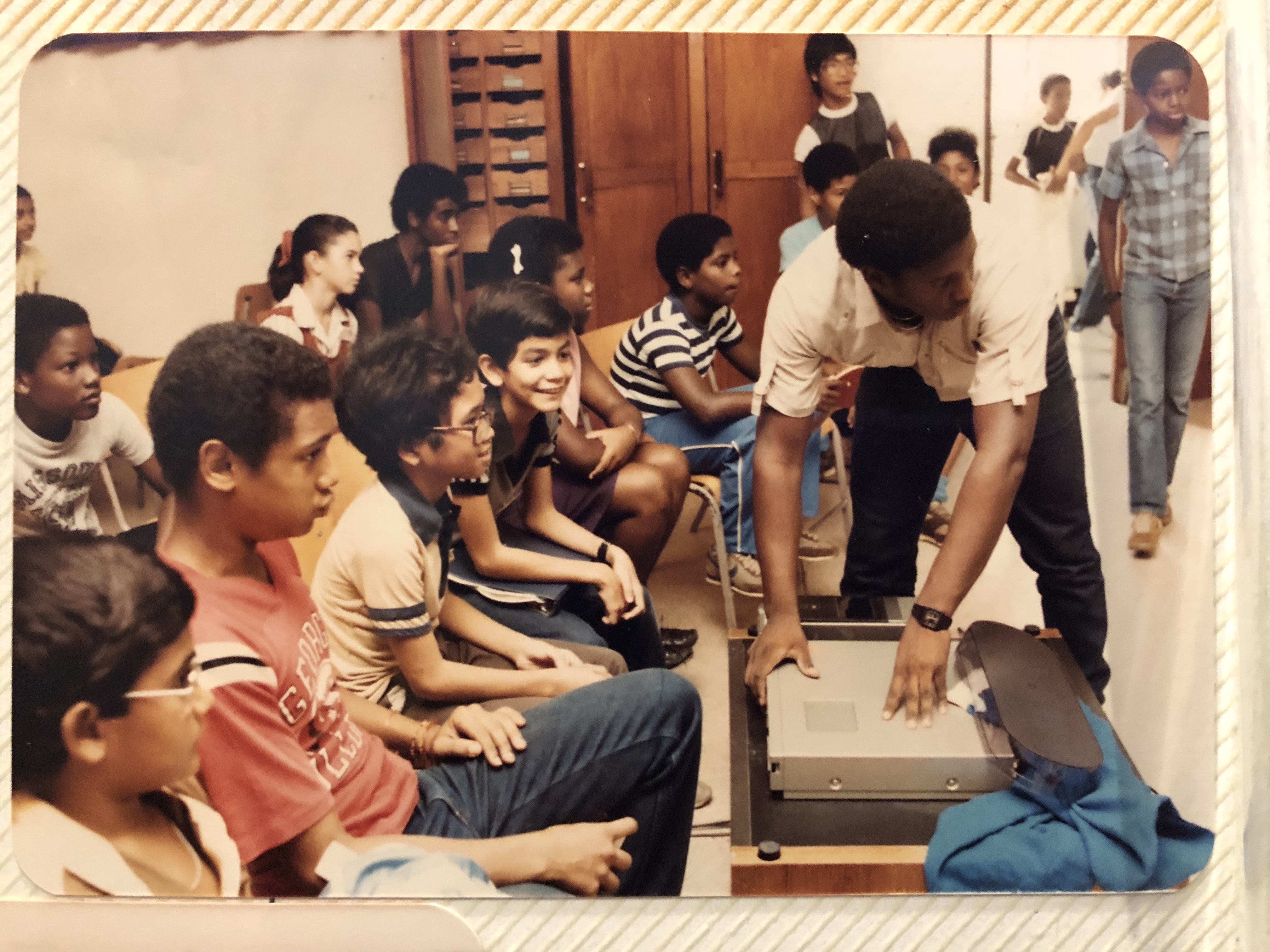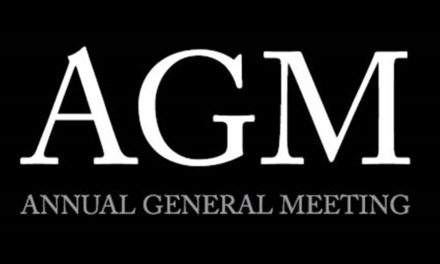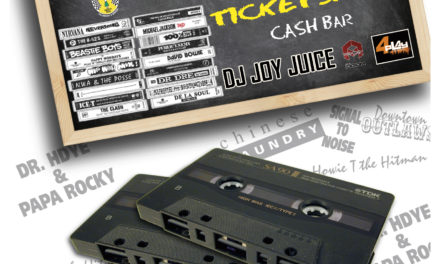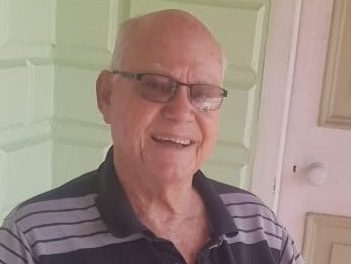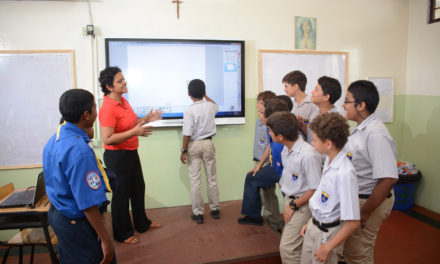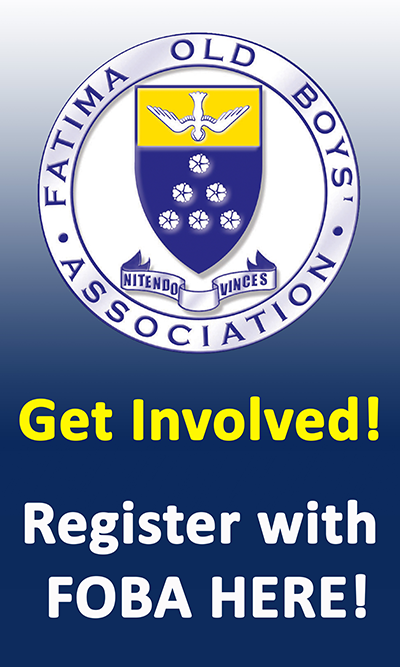- Views 2624
- Likes 1
While some boys may be born with a spoon of gold or silver in their mouths, there are those who say Anthony Jules (Class of 1984, Form 5) was born with a computer mouse in his hand.
Before he could get to that computer, Anthony had to attend to the business of being an outstanding Fatima Boy, in studies and sport. Entering the College in 1979, he established a track-record that was more than just exemplary – it was exam-plary: his Form Five results showed nine ‘1’s at CXC, and six ‘A’s at Cambridge, becoming one of the first students in the country to receive an ‘A’ in Computer Science O-Levels. Two years later, he earned an Additional Scholarship in ‘A’ Levels.
He stayed on at Fatima for two more years, assisting Fr. Reginald DeFour in the newborn Computer Department, and even undertaking activities inclusive of raising funds to get the Fatima Computer Programme fully off the ground.
Then came bigger, more global times for Anthony: he headed out to MIT to secure his BSc and MS in Computer Science; and subsequently pivoted from academia to a work career, joining world-class companies such as Google, Sapient, and Activision.
Today, Anthony lives with his wife and two children in Oakland, California…with the memories of being a Fatima Boy clear in his mind, and that computer mouse continuing to be close at hand.
Q: Why did you choose Fatima College as your Secondary School?
A: Fatima’s reputation for both high academic achievement and producing well rounded young men was my biggest influence. I have always been of the mind that you have to attend to the whole person: body, mind, spirit and community.
Q: What are some of your fondest memories of Fatima—including nicknames?
A: My fondest memories are the feelings of camaraderie with my Form 6 class. It is a very unique time in a man’s life. For me I was coming into new power physically and intellectually and I was surrounded by a wonderful group of young men who were going through the same thing. I got to share that experience with them and it created a sense of belonging and connection that has lasted for decades. We had many adventures and misadventures together, all adding up to my becoming the man I wanted to be. My most memorable Nickname was “Prime Minister” or PM for short!
Q: Which teacher(s) did you find to be the best for you, and those you gave the most trouble?
A: I didn’t give teachers much trouble. I tended to just avoid them when I wanted to do something against the rules. Many of the great teachers at Fatima influenced me a lot. Mr. Francisco Garcia was a great inspiration for me in Physics. Mr. Sunderji for Math. After graduating from Fatima, I spent the next year working at Fatima as the assistant to Fr. Reginald DeFour, the head of the Computer Department. He was a great teacher and inspiration in learning about Business, and how to get things done with large groups of people.
Q: Amongst the lessons learned at Fatima, which proved to be the most valuable for you?
A: My most valuable lesson was to try to put yourself into other people’s shoes. I do this all the time. Sometimes to be compassionate, sometimes to understand customers, sometimes to understand people I work with. Everyone has their own story, their own struggles happening at the very instant. If you take the time to listen to them, it is amazing how much you will learn and how seldom their story is the same as the one you made up about them in your head. Remembering to do this lets you see things for what they really are more of the time.
Q: How did Fatima contribute to making you the man you are today? And what advice would you give to the present students?
A: Fatima contributed in ways too numerous to mention. The overarching reality is the tremendous opportunities Fatima offers. Education, sports, friendships, spirituality, community all of these are available to a greater degree than you can absorb.
My advice to current students is: taking advantage of opportunities requires clarity of purpose and work. The hardest part isn’t the work—it is being clear with yourself about what your goals are. Once you have that clarity, the work follows naturally. So, my advice is to write down your goals. Do this at least once a year and look back at them and revise them at the beginning of every term and see how you did at the end of each term. You will be surprised with the profound effect this small practice will have.
Q: Have you been able to maintain friendships with your classmates since leaving Fatima?
A: I have maintained a number of close friendships since school. Also, my class has a very active email and Facebook group led by Raymond Samms. It is a truly rewarding source of information and connection that has kept us in touch for years. I have to admit I am a bit of a “lurker” though. I read everything, but only chime in occasionally.
Q: At MIT, you worked in the Media Lab and the Artificial Intelligence Laboratory, where you grew fascinated with projects to create intelligent machine assistants. Robotics eventually became your forte. Did you have that interest in Fatima College or did it develop while you were at MIT?
A: Even at Fatima, I was interested in Artificial Intelligence and robotics. I first started programming computers when I was 11, just before I came to Fatima. I quickly became completely captivated by the idea that you could get a machine to do exactly what you desired if only you could express your instructions clearly and correctly. As part of my interest in programming, I read a textbook on Artificial Intelligence when I was 14, and it then became clear that I wanted to build intelligent machines later in my life. It was this goal that led me to MIT in the first place, and has been in the background of much of my work, even when it isn’t clear from the outside.
Q: 2015 Hall of Achievement Inductee Robert Wickham, was one year behind you in Fatima and attended MIT at the same time as you. Were you guys close at MIT? And were there any other Trinis at MIT?
A: Yes. Robert and I were close at MIT. We were also close with Graham Fernandes, another Fatima Boy and MIT alum. Graham, Robert and I played Squash for MIT’s Varsity team for the whole time we were students there. At the US collegiate level, Squash is played by a team of nine. For our years together, MIT’s top 9 had three Trinis and three Fatima boys! We had great fun and great accomplishments together, on and off the court.
Q: MIT is known for its intense academic atmosphere, yet both you and Robert played Squash at MIT. How important was it to strike a balance between academics and sports?
A: While MIT is famous for its academics, it also has a significant athletic requirement. All students are mandated to complete this athletic requirement to graduate. To do so, you can take classes and activities and/or compete for the school. Robert Wickham, Graham Fernandes and I all competed for MIT at the Varsity (highest) level. This meant we had regular practice (2 hours most weekdays), as well as 20 or so matches with other Universities each season. This was demanding, especially when added to the considerable academic workload.
However, as many people have experienced, academics and athletics can complement each other. I was a better student because I was a competitive athlete. Additionally, the hard work and mental toughness that sports forge in a young person are incredible resources for one’s career and the rest of life. While balancing athletics and academics can be hard, it really is worth it.
Q: At age 32, you walked away from a lucrative high-tech career in internet and computer consulting to spend time snowboarding in the Sierras and advising small start-up companies. It was described as a kind of retirement. Explain that decision and have you had any more ‘retirements’ since then?
A: We are living in a time in which life and technology are changing extremely rapidly. As a result, I believe we should retool ourselves every 10 years or so, and I have done this pretty consistently. As a result, I have often ‘retired’ for a year and spent time taking stock, broadening my exposure, and acquiring a new set of skills. I have ‘retired’ three times and will likely do it a few more. When I ‘retire’, it simply means I am not doing what I was doing before and I am going to spend some time learning something different. I keep a very flexible schedule and It looks to everyone on the outside like I am not doing much. So, I describe it as ‘retirement’. Then I usually join or start a new venture and open the next chapter of my life.
Q: 2008-2012: Principal of Jules Studios LLC (personal think tank for exploration of Robotics, CAD/CAM/CNC, and Generative Design). 2012 to 2014: Chief Operating Officer and VP of Product at Redwood Robotics, which specialized in robotics and automation. 2014 to present: Senior Product Leader at Google. Google seems somewhat out of place in that list. Why Google?
A: Redwood Robotics was acquired by Google in 2014. As part of that acquisition, I became a Google employee and led robotics projects there for a few years.
Q: At one point in your life, among your dreams were: starting a family, inventing amazing robots, and maybe even communicating with dolphins. What are your current dreams?
A: I have a family now. Dolphins are going to be REALLY hard to talk to! So, my current dream is back to building intelligent machines. What is going on right now in Artificial Intelligence is one of the most exciting changes I have seen in my career. In the last five years, a sub-field of AI called “deep learning” has been making remarkable progress in solving many AI problems. In fact, I am taking the next year to study AI again, because what has happened in the last few years is so incredible. After this learning phase, I will likely start my next venture by combining the new things I have learned with my prior history and experience.
Q: What do you see as the biggest challenge for the young boys of this era and what can Fatima do to support them to deal with this?
A: Across the entire world the pace of knowledge acquisition and technological change is increasing constantly right now. This is not a temporary shift, but the new mode of humanity’s progression. Over the large arc of time, humanity has been progressing from lack of knowledge toward more and more knowledge and the understanding of the Universe. The pace of this change has always been increasing, but now the pace is blindingly fast and arguably faster than our ability to adapt.
Concretely, what this means is that people will need to learn new information constantly, and occasionally learn new skills throughout their lifetime. It is very unlikely that the specific thing you study in University will be the profession you are in 10 years later. As a result, people who are lifelong learners will outpace those who aren’t. To prepare for this future, Fatima needs to teach more than current knowledge. Fatima needs to teach how to learn. This means teaching how to question, how to research, how to find information, how to discern truth from the deluge of opinions parading as truth. This also means helping each student identify what type of learner they are, and how to work with their strengths and weaknesses most effectively when they are learning on their own.
Q: Over the years FOBA has undertaken school improvement projects such as: installing smart boards, air conditioning classrooms, and sustaining the sports teams with coaches and kits. What would you like to see the Alumni body and school implement in the future?
A: I don’t feel close enough to the school to know what curriculum at Fatima looks like right now. But a class on “How to Know What is True on the Internet” is among my top choices for everyone in the world right now.
Q: How old are your children and do any of them seem to share your interest in programming or similar fields?
A: I have nine-year-old twins. A boy and a girl. They are both quite clever and interested in computers. My son is a bit more interested in programming and my daughter is a bit more interested in visual design, but they both dabble in whatever grabs their interest. My wife and I also strongly value personal interaction and getting out into the real world. Therefore, we make sure they spend plenty of time building things with their hands, spending time in nature and talking to and interacting with other people (without electronics!)
Q: Do you still play Squash and do you have any other hobbies or interests?
A: I have not played Squash in years. I don’t have access to courts close to where we live.
My non-work interests these days revolve mostly around family, and things my kids are interested in. Although, I do still love to snowboard whenever I can.
Q: How often do you visit Trinidad and what is the first thing you tend to do when you land?
A: Our family comes to Trinidad for the holidays every other year. It is such a special time to spend with family and to get to see friends. So other than my parent’s food, we always have to have roti (from wherever is the best place these days) and doubles for “Sauce” in Curepe. My uncle has a boat, so we will usually spend some time down the islands. We have to make a Maracas trip, and we usually try to squeeze in some time in Tobago too.
Q: What did receiving the Hall of Achievement Award mean to you?
A: Receiving the Award was truly unexpected and an incredible honor for me. As might be clear from my bio and interviews, I am living far from Trinidad, inventing machines, building companies and forging a life for myself and my family. To receive recognition from my peers and the people who form so much of what is my foundation means a great deal to me. I am deeply grateful.
Q: Any closing remarks?
A: The unforgettable: Strive on Fatima Boys… Strive On!
